|
|
|
Sort Order |
|
|
|
Items / Page
|
|
|
|
|
|
|
| Srl | Item |
| 1 |
ID:
161351
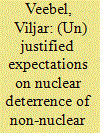

|
|
|
|
|
| Summary/Abstract |
Nuclear assets are one of the cornerstones of credible collective deterrence of the North Atlantic Treaty Organisation. Paradoxically, the most endangered member states are the ones without nuclear capabilities, left with the hope and expectation that the owners of nuclear assets will defend them and that their potential enemies are deterred by these capabilities. However, the expectations from one side, practical commitment of allies from other side may not go in harmony and synchronisation. Is there a capability gap which needs to be fulfilled? If yes then, is the gap in the side of nuclear powers or is it on the side of those endangered states who need to understand what can or cannot realistically be expected? The current article focuses on the question of how the political and military elite of the Baltic states describes their expectations in terms of using Alliance's nuclear capabilities to deter Russia's regional ambitions.
|
|
|
|
|
|
|
|
|
|
|
|
|
|
|
|
| 2 |
ID:
161350
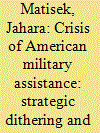

|
|
|
|
|
| Summary/Abstract |
The United States has provided substantial amounts of military assistance and aid since the end of World War Two. During the Cold War, it proved vital in protecting numerous regimes from communist takeovers. Successful outcomes occurred when American leaders made large initial aid commitments, and the states had the capacity and political willpower to use it effectively. However, Vietnam was an example of how U.S. support lagged, as leaders in Saigon preferred political survival instead of creating regime legitimacy. Following 9/11, American security aid focused on making weak countries develop stronger security forces. Unfortunately, this created Fabergé egg militaries: expensive and easily broken by insurgents. This article suggests long-term strategic commitments need to be made alongside more resources for the American State Department and similar organizations to focus on the politics of state-building. Finally, this article suggests strategies, such as “whole-of-government” approaches, to improve long-term security and political institution building.
|
|
|
|
|
|
|
|
|
|
|
|
|
|
|
|
| 3 |
ID:
161348
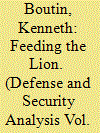

|
|
|
|
|
| Summary/Abstract |
In analysing trends in Chinese defence engagement and their impact on defence development in African states, it is important to consider both China's changing policy priorities and its capabilities for the provision of defence support. China's international ambitions and its economic development contribute to its emergence as a key supporter of defence capability development in Africa, occupying a crucial niche as a provider of support, particularly arms transfers, appropriate to evolving local requirements. The economic and politico-military imperatives driving China's engagement of Africa, which stem from its economic reforms and re-emergence as a great power, are facilitating defence modernisation by accelerating the introduction of modern arms in substantial quantities. The commercial importance of arms exports and the growing importance of strategic ties strongly situate China to help sustain processes of defence capability development in African states over the long term.
|
|
|
|
|
|
|
|
|
|
|
|
|
|
|
|
| 4 |
ID:
161347
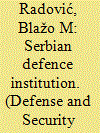

|
|
|
|
|
| Summary/Abstract |
The uncritical layering of western liberal defence governance norms and concepts on top of existing legacy concepts has impeded achieving coherent military capabilities and capacities when Serbia’s political and military leadership tried to reform the defence system using Western benchmarking principles and Western countries’ best practices. The process of this change has been more valuable than its actual output, as defined by increased capabilities. Such outcomes should be reflective of policy guidance, and can be thought of as closing the trinity loop of a defence planning system: plans, money and execution. This article addresses two key functional areas of the Serbian defence institution. First, it assesses the current state of defence planning to discern its strengths and weaknesses to ascertain if plans are tied to financial decision-making. Second, a full examination of current Serbian defence management is conducted to discern whether weaknesses exist that distract from producing operational capabilities. Both areas are analyzed thoroughly and some solutions for change are proposed. Also, the article analyzes the appearance of two negative phenomena in the planning process – economization and managerialism.
|
|
|
|
|
|
|
|
|
|
|
|
|
|
|
|
| 5 |
ID:
161349
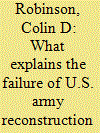

|
|
|
|
|
| Summary/Abstract |
This author wrote his doctorate thesis on post-conflict army reconstruction, submitting it in 2011. Continued research on the subject in the intervening seven years indicates that his theoretical propositions can be refined and improved. This article examines refinements to the model, and then applies those refinements in detail to the Afghan case. In so doing, it shifts the focus from potentially altruistic state-building to a case that was driven by pure national-strategic interests. Issues surrounding the liberal peace ideology dominate recent army reconstruction in conflict-affected states. The liberal peace underpinning is of supreme importance, so much so that in many discussions, it is internalised and accepted virtually without thought. This paper will advance the body of knowledge by establishing, for the first time, a theoretical basis for the widespread failure of army reconstruction in Afghanistan. The empirical basis builds on extensive previous research by other scholars. The resulting model can also be applied to better explain outcomes in other similar cases.
|
|
|
|
|
|
|
|
|
|
|
|
|
|
|
|
|
|
|
|
|